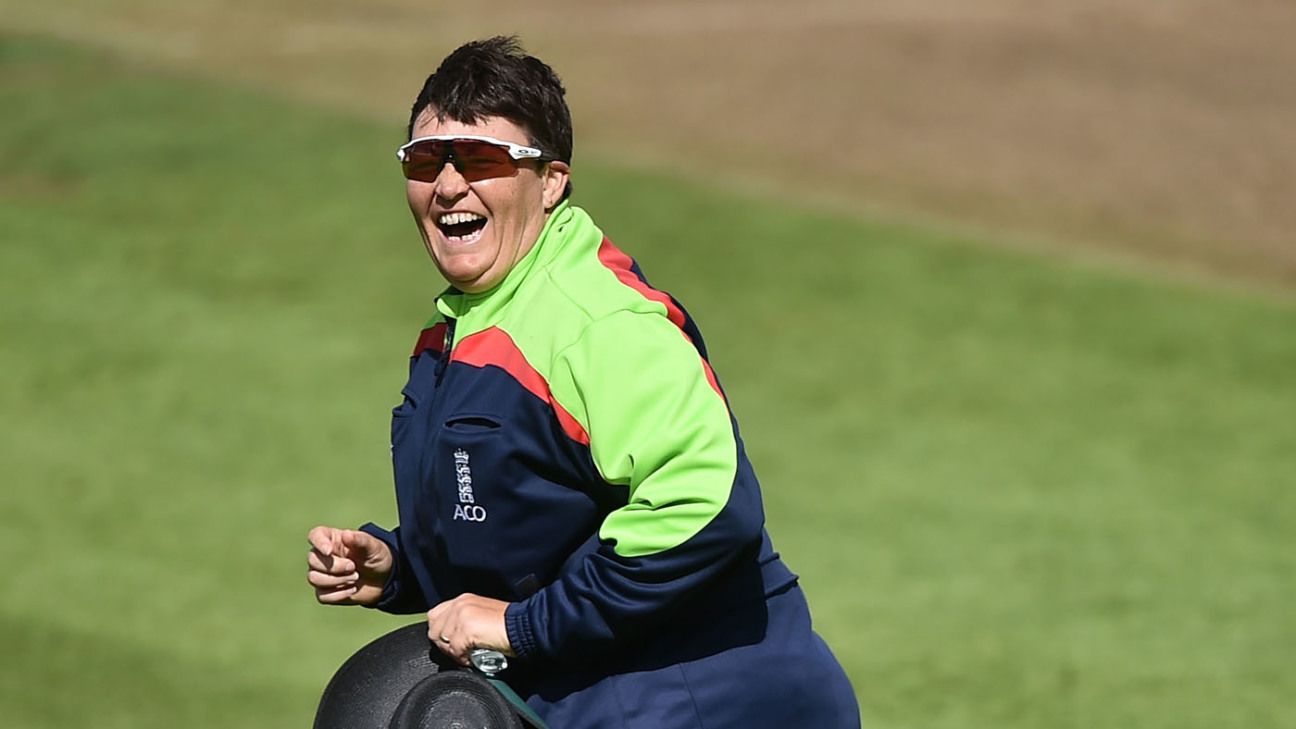Sue Redfern ready to blast stereotypes as standing umpire
“This Blast debut is important because a lot of people know me as a female umpire in women’s cricket and yes, whilst that is really important and I hold that dear to my heart and I’m very lucky to be given the opportunity to umpire in World Cups and international women’s cricket, it’s so important that people see women in different roles throughout, in men’s cricket as well,” Redfern told ESPNcricinfo.
“It’s about providing female umpires with steps in where they want to progress, not just in women’s cricket but in men’s cricket, like myself. I want to umpire for women’s and men’s games. One isn’t better than the other. It’s about different challenges, it’s about different opportunities across those pathways.
“Myself and other female colleagues have had the opportunity to umpire at high levels in international women’s cricket. Through the ICC development panel of umpires a number of us have had the opportunity to umpire Associate Nations international men’s cricket. I think the next genuine step is if a female umpire has the ambition that she wants to progress in a male playing pathway, there’s recognition that actually it doesn’t matter what gender you are, as long as you have the skills associated with high performance for umpiring in those environments.”
Redfern’s appointment also points to another equally important factor, as she sees it, visibility. It’s a theme prominent amid the seemingly explosive growth in publicity around women in cricket, and other sports, in England and beyond.
“We know that when you look at how women’s cricket has accelerated, it’s had more exposure, so if people see women umpiring, women will say, ‘hang on a minute’, the visibility is the key thing there,” said Redfern, a regular umpire on the women’s international circuit. “Once we’ve got that visibility it’s making sure it’s clear what you can do to become an umpire – the courses, the training, employment – where can you go and the support you get.
“My experience is I’ve worked hard across various platforms in men’s and women’s cricket to progress my way up to be a professional umpire and there’s no reason why other women can’t do that. What is really important is that they are being given the opportunity to do that and that continues and then if they’re good enough they should have exactly the same chances as any other candidate.”
In a blog for the ECB about her upcoming experience in the Blast, Redfern, 45, spoke of feeling fortunate to work in a field she loves and reminding herself that she has reached this point through hard work and on merit. But does she see a time when she doesn’t feel the need to remind herself that she deserves to be where she is, when her job is just something she does and enjoys?
“Every umpire that progresses has to work hard,” she said. “Your performances will dictate the next opportunity which you get and the key thing here is making sure that there’s no bias in selection and there are opportunities whether you’re male or female and it is based on performance.
“We shouldn’t be stereotyping women into women’s cricket, men into men’s cricket. It should be about what skill sets are needed for this game of cricket, who has got those skill sets, and we need to remove any bias that there might be across the pathways.”
Redfern, a former England player and now a regular official on the international women’s circuit, was an on-field umpire in a World Cricket League Division Five match between Oman and Nigeria in 2016. With West Indies-based umpire Jacqueline Williams acting as third umpire in the same match, it was the first time two women had officiated in a men’s ICC tournament fixture. Last year, Redfern became the first woman to officiate in an England men’s home international as fourth umpire during the first T20I against Sri Lanka in Cardiff.
“The next genuine step is if a female umpire has the ambition that she wants to progress in a male playing pathway, there’s recognition that actually it doesn’t matter what gender you are, as long as you have the skills associated with high performance for umpiring in those environments.”
Sue Redfern
Domestically in the women’s game, the inaugural season of the Rachael Heyhoe Flint Trophy in 2020 saw ten women work as standing umpires during the tournament. So there has been progress in developing female umpiring talent and providing opportunities in both women’s and men’s cricket. But Redfern believes there is more to be done. During the English winter she will work with the ICC to help male and female officials in Europe develop their skills.
“The Blast game coming up is another step in terms of my ambition and then following that would be a first-class debut in the men’s County Championship, that would be an aspiration,” she said. “Then moving on and upwards to the highest level I can officiate in. Obviously that would include men’s international cricket. But a lot of people have got aspirations to umpire in that environment as well. The key thing is I keep learning, I keep developing and I keep improving as an official.”
Valkerie Baynes is a general editor, women’s cricket, at ESPNcricinfo
For all the latest Sports News Click Here

